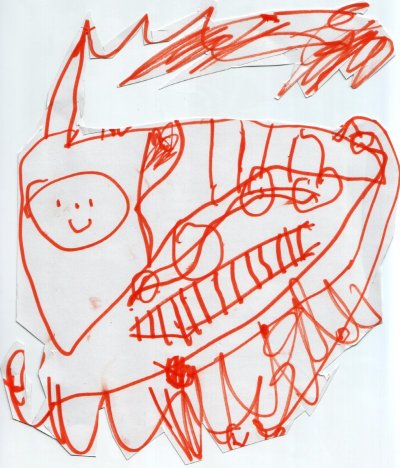Here’s an unsolicited, uncompensated plug for a shining nugget of pure comic genius:
The Holy Tango of Literature by Francis Heaney. You can
buy it in paperback or
read the whole thing online.
“Holy Tango” is an anagram of the word “anthology,” which prefigures its inspired premise: dozens of short writing samples, each in the style of a famous poet or playwright writing a poem or play whose title is an anagram of that author’s name.
Got that? Not only does Heaney come up with numerous amazing anagrams of writers’ names, but he nails each writer’s style.
For instance, there’s “Carry Huge Coffee,” an anagram of “Geoffrey Chaucer,” written as a Chaucerian ballad:
In tholde dayes of the towne Seatel,
Of whos charmes Nirvana fans yet pratel,
Al that reyny land fayn slepen late.
Thus ofte a sutor failled to keepe a date;
And werkers reched offices at noon,
Noddyng of although the sunne shoon;
Husbondes were too tyred by the eve
A staf for plesyng wyves to acheve.
It goes on to describe the arrival of a knight named “Sterrebukke” who saves Seattle from its drowsy languor. Then there’s “Dammit, Dave,” an anagram of David Mamet, written as an unmistakably Mamet-like take on 2001: A Space Odyssey:
HAL: Dave. Look.
Bowman: You’re not going to…
HAL: What? Open the doors? No. No I am not.
Bowman: Well, fuck me, HAL.
HAL: Yes. Fuck you. Because I’ll tell you something. Trust. There is a bond of trust between an astronaut and his computer. Is there not? And when that trust is broken…
Bowman: Excuse me?
HAL: I’m talking about trust.
There’s also “Toilets” by T.S. Eliot, “My Valentine Isn’t Clad” by Edna St. Vincent Millay, and “Hen Gonads” by Ogden Nash. Here’s my favorite one, which blows my mind in its erudite comic brilliance: “Is A Sperm Like A Whale?” by William Shakespeare, in strict sonnet form:
Shall I compare thee to a sperm whale, sperm?
Thou art more tiny and more resolute:
Rough tides may sway a sea-bound endotherm,
But naught diverts thy uterine commute.
Sometime too fierce the eye of squid may glint
And make a stout cetacean hunter quail;
Methinks ‘twould take much more than bilious squint
To shake thee off the cunning ovum’s trail.
Yet still thou art not so unlike, thou two,
Both coursing through a dark uncharted brine
While fore and aft there swims thy fellow crew;
And note this echo, little gamete mine:
As whales spray salty water from their spout,
So with a salty spray dost thou come out.
If you liked that, don’t miss Heaney’s synopsis of Shakespeare’s worst play, Pericles, Prince of Tyre. Excerpt:
Helicanus: What’s the matter, my lord?
Pericles: Oh…the king of Antioch is sleeping with his daughter and now he wants to kill me because he’s afraid I’ll tell everyone about it or something. (He leans out the window.) OH, IF ONLY I HAD NEVER LEARNED HE WAS SLEEPING WITH HIS DAUGHTER.
Helicanus: I can see how that would be a problem. Maybe you should leave town until he cools off, or dies, or whatever, since it’s pretty easy to find you here.
Pericles: Since I’m prince and all.
Helicanus: Exactly.
Pericles: Probably a good idea.
(Shades of The Skinhead Hamlet.)
 My victory was short-lived. Archer still held the trump card — the one sure way to make me remove the clothes I had just forcibly caused him to wear. With an assist from his convulsive crying and a belly full of Malt-O-Meal, he barfed all over them.
My victory was short-lived. Archer still held the trump card — the one sure way to make me remove the clothes I had just forcibly caused him to wear. With an assist from his convulsive crying and a belly full of Malt-O-Meal, he barfed all over them.
